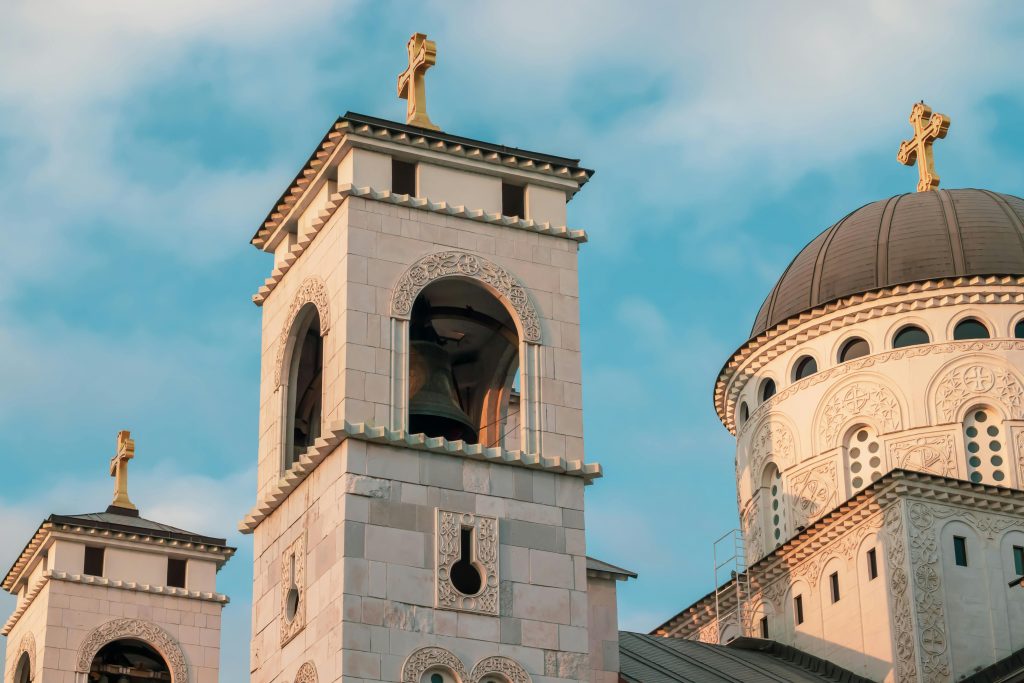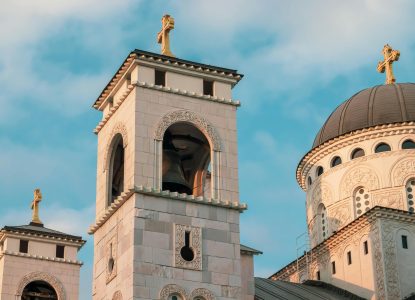By JoAnne Wadsworth, Communications Consultant, G20 Interfaith Forum
– – –
On January 25th, the G20 Interfaith Forum’s Anti-Racism Initiative, in cooperation with the International Academy of Multicultural Cooperation, held a webinar entitled “Nationalism, Religion, and Discrimination in the Western Balkans.”
Speakers included Dr. Nemanja Batrićević, a Montenegrin political scientist at the University of Montenegro, and Tanya L. Domi, an Adjunct Assistant Professor of International and Public Affairs at Columbia University’s School of International and Public Affairs and an affiliate faculty member of the Harriman Institute. Alek Barović, a Montenegrin writer, activist, political scientist, and PhD student, moderated the discussion.
Barović opened the webinar by welcoming all the attendees, providing brief introductions for the speakers, and sharing an overview of the topic at hand. He said that lately there have been increasing instances of nationalist-driven religious discrimination in Western Balkan countries, including Montenegro, Serbia, Kosovo, and Bosnia and Herzegovina. He said he hoped the discussion would address the roots of the nationalist problem, provide a clear picture of the current situation in these countries, and bring forward potential solutions to help the Western Balkans become more friendly to human rights. He then invited each speaker to provide their thoughts on the issue.

Dr. Nemanja Batrićević
Batrićević focused his comments on the conflict over Montenegro’s independence and national identity, as manifested in the Serbian Orthodox Church’s actions in Montenegro. He said that the closest thing that he can find to the relationship between Montenegro and Serbia is that between Ukraine and Russia, where one country sees itself as independent and the other sees it as an offshoot, part of a greater whole. The debate over Montenegro’s independent identity traces back to its absorption into Yugoslavia (together with Serbia) in 1918, and though the two countries stayed together as a political union for fourteen years after Yugoslavia ended in 1992, that union peacefully dissolved in 2006, making Montenegro independent, though some Serbian entities don’t see it that way.
Adding to that, Batrićević said there is a longstanding entanglement between the Eastern Orthodox church and the state. As the Eastern Orthodox church doesn’t have a central structure, church jurisdiction follows state boundaries—and as, under the Ottoman Empire, church identity was the only thing preserving previous national identities, the church has long been trusted as the safeguard of history and national identity. When they speak on national issues, people listen. Batrićević said this has proven problematic in that it’s being used to deny Montenegrin national identity.
“This entanglement between national and religious labels still exists. So, since Montenegrins and Serbians are common in their Eastern Orthodox faith, that has been instrumentalized to mean that ‘everyone who is Eastern Orthodox is a Serb.’”
Batrićević provided several examples of how this conflict is playing out in current events. He said that the national census in Montenegro was called “the most important issue this year” by the Serbian government, and the Serbian Orthodox Church called for all its members in Montenegro to identify themselves as Serbs on the census, urging them to give up their national identity for religious reasons.
In the past, Batrićević said that when someone got baptized in Montenegro, they used to write both religion and nationality on the certificate. Now, they will only write “Orthodox Serb.” So, one automatically loses their national identity to keep their religious identity.
“In this case, religion is acting much more as a political instrument and much less as a symbol of freedom and good belief. There is no worse negation of someone’s rights than taking away their ability to practice religious beliefs. If you live in Montenegro, you can’t get baptized or married or buried in a church or even enter the monasteries your ancestors built without giving up your Montenegrin identity. All religious rights are gone.”
Tanya L. Domi
Domi focused her comments on current issues in Bosnia and her experiences with US interventions working as a congressional aide during the Bosnian War. She said Bosnia is the most ethnically diverse country in the Balkans, with a 22 percent intermarriage rate between Bosnian Muslims, Catholic Croats, and Orthodox Serbs.
“The branding of Yugoslavia during its existence as a nation, “brotherhood and unity,” was one of the strongest brands of the 20th century, and many believed it until the war actually broke out in Bosnia. All these people who were doing everything together were shocked when the war began.”
She said that the brutality and viciousness of the war, with 110K dead and 2 million displaced, showed how much hatred focused on ethnic identity and religious affiliation had truly erupted into something monstrous, culminating in the Srebrenica massacre, where over 8,000 Bosniak Muslim men and boys were killed by Orthodox Serb forces, supported by the Yugoslav army in Serbia. In addition, she said the media was controlled ethnically and religiously, and was used to foment the hatred and justify the killing—resulting effectively in the destruction of the entire society.
Since the U.S. intervention in the war, resulting in peace through the Dayton Agreement of 1995, Domi said that many of the ethnic and religious issues in the nation haven’t just remained, but have become codified into law. The American state officer who wrote the Dayton Peace Accords organized the country around identity, dividing the country into Bosniaks, Bosnian Serbs, and Bosnian Croats. People identifying as “other,” or those who are Roma or Jewish, still can’t even run for public office in the country.
Domi said that the people who wrote the Dayton Agreement realized that the document was designed to stop the carnage, but not establish a vibrant democracy and be sustainable. They clarified that it wasn’t set in stone and would need to be amended. However, in the years since, it has effectively created layers of obstacles to amendment or national control, with ethnic groups in the government blocking each other and stopping the process of governance.
In addition, she said Serbia continues to cast a long shadow over the region through the Orthodox Church, which is used to obtain undemocratic political objectives and exclude people, imposing religious values by law on many who still identify as Yugoslavs from the Soviet Union and claim no religion.
Q&A Session
After the speakers’ thoughts, Barović opened the floor to the audience for a short Q&A session.
Batrićević clarified that the Montenegrin Orthodox Church is a separate entity from the Serbian Orthodox Church, but that since the dissolution of the Montenegrin state into Yugoslavia in 1918, the Montenegrin Orthodox Church has effectively had no rights or control. Since independence was renewed, the Serbian Orthodox Church still controls all the monasteries and religious sites in Montenegro, and the Montenegrin Orthodox Church is wildly discriminated against. He said that Montenegro’s new constitution reasserts Montenegrin rule in everything except religion.
Domi expressed her opinions on the current U.S. administration’s attitude toward diplomacy in the Balkans, saying that there is no serious approach to the region and that she sees it as a highly cynical approach and a vast disappointment – a policy on life support.
Both agreed that Kosovo is a great case of how American diplomacy has failed in the Balkans, with the US calling out corruption in the area, then failing to support the only national leader who isn’t corrupt while aiding the corrupt leaders of neighboring countries.
In conclusion, Barović thanked all speakers and panelists for their time and invited all who weren’t able to attend to view the recording on IF20’s YouTube channel.
– – –
JoAnne Wadsworth is a Communications Consultant for the G20 Interfaith Association and acting editor of the “Viewpoints” blog.


